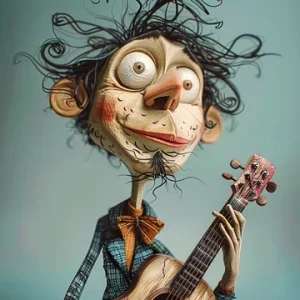By Jnanendra Das
 It was just another journey along the winding roads from Guwahati to Shillong, but what I carried back home wasn’t just the breathtaking vistas; it was an unexpected nostalgia triggered by a simple, shared cab ride. I had attempted to make small talk with the driver—a man of few words, whose primary companion seemed to be the red and black pen drive plugged into the car’s stereo. As we zipped through the cool, misty air, the cab filled with the unmistakable tunes of old Bollywood music, while the driver fondly chewed kwai (a combination of neatly folded betel leaf, slaked lime, and areca nut).
It was just another journey along the winding roads from Guwahati to Shillong, but what I carried back home wasn’t just the breathtaking vistas; it was an unexpected nostalgia triggered by a simple, shared cab ride. I had attempted to make small talk with the driver—a man of few words, whose primary companion seemed to be the red and black pen drive plugged into the car’s stereo. As we zipped through the cool, misty air, the cab filled with the unmistakable tunes of old Bollywood music, while the driver fondly chewed kwai (a combination of neatly folded betel leaf, slaked lime, and areca nut).
The driver’s choice of music was refreshingly authentic. The music provided a comforting, uninterrupted backdrop, free from the ads and buffering of the streaming apps. It was a pure, timeless sound, featuring legends like Altaf Raja, Kumar Sanu, and Alka Yagnik. Amid the melodious chaos, a song by the composer duo Sajid-Wajid grabbed my attention. The track, “Soni De Nakhre” from the film Partner, carried me back to a time when I confidently belted out lyrics I thought I knew, only to realise much later how hilariously wrong I had been.

For years, I had sung, “Candy pawn puppy jam candy, o jaane jaana candy paw,” with complete conviction. It wasn’t until I stumbled upon the correct lyrics—”Oh Keinde Pump Up The Jam, Oh Keinde… Oh Janeh Jannah keinde”—that I realised my mistake. This misinterpretation prompted a deeper dive into the phenomenon of misheard lyrics, a universal experience that has even earned its own term: mondegreen.
The Birth of the Mondegreen
The term mondegreen was coined in 1954 by American writer Sylvia Wright, who, as a child, misunderstood the lyrics of a Scottish ballad her mother used to read to her. The ballad, “The Bonnie Earl o’ Moray,” ended with the line, “They hae slain the Earl o’ Moray / And laid him on the green.” But young Wright heard it as, “They hae slain the Earl Amurray / And Lady Mondegreen.” This charming misinterpretation gave rise to the term, which has since been used to describe the many ways in which we all creatively mangle lyrics and phrases into something entirely new. Wright argued that mondegreens, in some cases, are even better than the original phrases. [Source: Sylvia Wright (1954). “The Death of Lady Mondegreen”. Harper’s Magazine. Vol. 209]
As music became more global, the phenomenon of mondegreens grew, especially with songs in unfamiliar languages. Think of how many times we have butchered the lyrics to Luis Fonsi’s “Despacito” or Shakira’s “Waka Waka (This Time for Africa).”
The Psychology Behind Mondegreens
So why do we frequently mishear lyrics? Cognitive psychology and linguistics might have the answer. At its core, a mondegreen is the brain’s way of making sense of something that might otherwise be unintelligible. When we hear a song, our brain works to interpret the sounds into familiar words or phrases, even if those interpretations are inaccurate. (Source: “Earslips: Of Mishearings and Mondegreens” by Steven Connor)
This is partly driven by cognitive dissonance, the discomfort we feel when we can’t quite make out the words in a song. Our brain doesn’t like uncertainty, so it fills in the gaps with what makes the most sense to us. Additionally, confirmation bias plays a role; if a particular word or phrase is familiar or expected, our brain is more likely to insert that word into the lyrics, even if it doesn’t belong there. For instance, Taylor Swift’s “Got a long list of ex-lovers” is often misheard as “All the lonely Starbucks lovers” in her song “Blank Space.” Similarly, Lana Del Rey’s “I’m feeling electric tonight” can sound like “I’m feeling ill like Drake tonight” to some listeners.
The Joy of Misheard Lyrics
Mondegreens reminds us that music isn’t just about the artist’s message; it’s about our personal experience. The way we interpret, misinterpret and internalise lyrics makes each listening experience uniquely ours. These quirks of perception create memories and inside jokes that stick with us far longer than the original lyrics might. In a world where every song can be googled for its official lyrics, it’s comforting to know that mondegreens still thrive, making our interactions with music as personal as ever.
So the next time you confidently sing along to your favourite song, only to later discover you’ve been getting the words wrong for years, don’t be embarrassed. You’re in good company. After all, the beauty of music lies not just in the notes and lyrics, but in the way we each make it our own.



